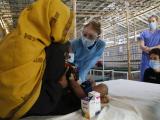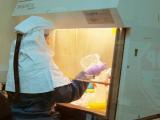Nov 7, 2008 (CIDRAP News) An independent board that advises the US Department of Defense on science and technology issues issued a report on Election Day highlighting a range of priorities for the incoming Obama administration, including measures to prevent and respond to a bioterrorist attack.
In the 72-page report, the Defense Science Board said its list of concerns and recommendations was gleaned from a June task force. The report was dated August 2008 but was released on Nov 4, according to a Nov 5 report from Government Executive.
The group emphasized that more than two generations have passed since the presidency has changed hands while American troops were engaged in combat. "The incoming leadership must be prepared to deal with the most pressing issues facing the Department of Defense today," the board wrote. The issues "are daunting and may seem all-inclusive, but they are only a fraction of the defense challenges facing the new administration."
Thwarting biological, radiologic attacks
Bioterrorism is a rising concern, because biotechnology advances have made it easier to prepare infectious agents within the United States, according to the report. Reducing the nation's vulnerability to such attacks requires preventing enemies from acquiring the materials, improving the ability to identify perpetrators, and devising effective retaliation options.
Terrorists could stage a weapon-of-mass-destruction (WMD) attack with materials or equipment purchased or stolen within the United States. The board wrote that one such vulnerability is a "dirty bomb" that could be made with the radioactive isotope Cesium-137, which is used at hospitals and clinics throughout the country.
Developing ways to mitigate the effects of an attack and recover afterward are two tactics that could hamper the plans of would-be attackers, the report says. "All of these elements require exquisite intelligence."
Better and stronger international efforts are needed to stem the proliferation of biological and nuclear materials and "loose expertise," the board said.
The nation remains underprepared to respond to a WMD attack, the group warned. "We lack capabilities to recover even from a low-yield nuclear event in a metropolitan area or a large-scale epidemic like plague." One important gap is a lack of surge capacity for medical resources, such as respirators and nurses, needed to respond to an attack.
Response exercises have been conducted too seldom and have lacked the right participants and size, the board said. Mechanisms are not in place for improving response plans based on exercise results, and some of the plans make the mistake of "double counting"assuming, for example, that the same National Guard units can be used for domestic response and foreign combat.
"Our recommendation argues for realistic and repeated planning and replanning, repeated exercising and improvement, and a radical increase in our medical surge capabilities," the report says. The board also emphasized the need for high-payoff medical, decontamination, and early-detection countermeasures.
Roles for responding to WMD attacks are clear for some areas that civil groups and the DOD are responsible for, the board said, but there is a "gray area" that is critical for the support of DOD missions: civil infrastructure such as transportation systems, commercial communications, the power grid, and defense industries.
Seeking a culture of preparedness
The United States is not prepared to respond to a homeland attack, the board wrote. "The response to Hurricane Katrina illustrated this point. Imagine a disaster on an even broader scale, or a series of deliberate attacks of a similar scale."
Factors that make the nation less resilient in an attack are the "just-in-time" delivery of crucial items such as water, food, power, and fuel, the report says. The authors also asserted that the mobility of American society has led to a breakdown of family and community networks that once provided leadership and support.
A culture of preparedness at each level of society is the key to "hardening" the United States against attacks, the board wrote. "Family preparedness is the fastest, least costly, most dispersed form of coping with a disaster," the group said, suggesting that military and first-responder families are the best candidates for starting to cultivate a culture of preparedness, because they move within society and can promote the readiness concept to others.
Private companies, though they have the best expertise for restoring services after a crisis, haven't been recruited by the federal government to be disaster-relief partners, the board said. The government has denied corporations and industry groups useful intelligence for guarding against infrastructure attacks. "Keeping private infrastructure operators at arm's length from governmental planning, intelligence, and response is not in the national interest," the report says.
However, it also acknowledges the difficulty businesses face in bearing the costs of preparedness. Incentives, liability limits, immunity, and waivers could be enacted to make first-response roles practical for private companies, the board said.
See also:
Defense Science Board report to new administration


















